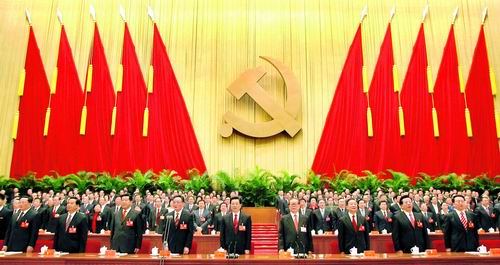
Top leaders of the Communist Party of China stand to
attention to sing the National Anthem at the start of the Party's 17th National
Congress in Beijing on Monday. - Xinhua
China will step up reform to reverse the growing gap between rich and poor,
Hu Jintao, general secretary of the Central Committee of the Communist Party of
China, said yesterday.
"We will increase transfer payments, intensify the
regulation of incomes through taxation, break business monopolies, create equal
opportunities and overhaul income-distribution practices," he said.
Hu
was addressing the 17th National Congress of the Party, which opened yesterday
in Beijing.
The congress will map out China's all-round development for
the next five years.
More than 2,000 delegates from 38 delegations
nationwide are attending.
High on the agenda is a draft amendment to the
Party Constitution to reflect the scientific outlook on development and new
achievements in the Party's theoretical innovation and progress in practice. The
congress will elect the 17th Central Committee that will decide the Party's new
leadership lineup for the next few years.
The congress, which comes to an
end on Sunday, will also elect a new Central Commission for Discipline
Inspection.
Hu stressed that equitable income distribution is an
important indication of social equity.
"Vigorous efforts will be made to
raise the income of low-income groups, gradually increase poverty-alleviation
aid and the minimum wage and set up a mechanism of regular pay increases for
enterprise employees," he said.
He pledged that conditions will be
created to enable more citizens to have property income, and the Party will
protect lawful incomes, regulate excessively high incomes and ban illegal
gains.
Hu detailed other plans for social development with the focus on
improving people's livelihood, to ensure that all the people enjoy their rights
to education, employment, medical and age care, and housing, so as to build a
harmonious society.
He said the country will promote balanced development of compulsory education
and move faster towards universal access to senior secondary education, a step
further than the current nine-year compulsory education.
The country will
also work to ensure that children of poor families and rural migrant workers in
cities enjoy the same access to compulsory education as other
children.
Hu promised to establish a unified, standardized labor market
and a mechanism that ensures equal employment opportunities for both urban and
rural residents.
The country will also improve employment assistance to
the needy and make it a priority to help zero-employment families to have job
opportunities.
It will also improve the low-rent housing system and speed
up resolution of the housing difficulties of low-income families in urban
areas.
The country will maintain the public-welfare nature of public
medical and health-care services, always put disease prevention first, center on
rural areas and attach equal importance to traditional Chinese medicine and
Western medicine, Hu said.
China has made spectacular economic gains
since the reform and opening drive launched three decades ago, but the
countryside lags, causing concern that the urban and rural gap might undermine
social harmony.
From 2002 to 2006, the per capita income of farmers has
risen by an annual average of 6.2 percent. For the first time since 1985, the
growth rate has exceeded 6 percent for three straight years.
But the gap
is still widening. The income of urban residents in 2006 was 3.28 times that of
rural people, up from 3.22 in 2005 and 3.21 in 2004.
The country's
richest 10 percent of families have more than 40 percent of the nation's wealth
and the poorest 10 percent have only two percent.



